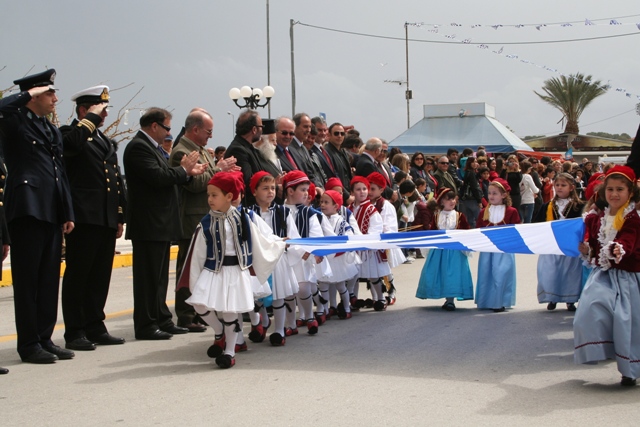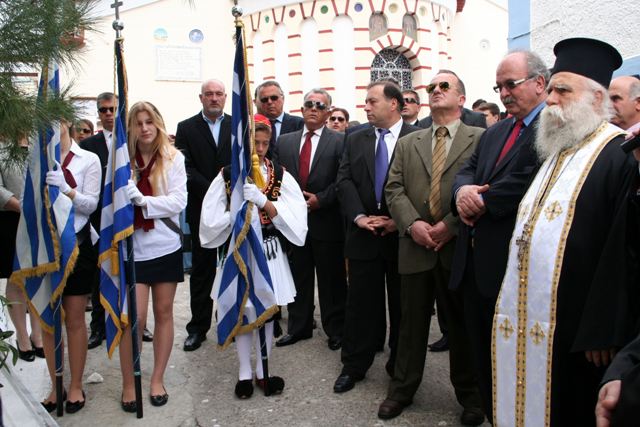 Greek Independence Day is a national holiday throughout Greece and is celebrated in Greece on 25th March. This day commemorates the start of the Greek War of Independence in 1821, as Greece had been occupied by the Ottoman Empire for nearly 400 years. The traditional story is that the Greek revolt was precipitated on 25th March 1821, when Bishop Germanos of Old Patras blessed the flag of revolution at the Monastery of Aghia Lavra, near Kalavrita. This day also happened to coincide with the Greek Orthodox church's celebration of the Annuciation. In reality, the revolt had already started when the city of Kalamata was liberated on 23rd March, by the fighters of the Mani region who had marched from Areopoli. The Hellenic rebel fighters experienced early successes on the battlefield, but infighting ensued. By 1827 most of the country had been recaptured by the Ottoman Turkish forces.
Greek Independence Day is a national holiday throughout Greece and is celebrated in Greece on 25th March. This day commemorates the start of the Greek War of Independence in 1821, as Greece had been occupied by the Ottoman Empire for nearly 400 years. The traditional story is that the Greek revolt was precipitated on 25th March 1821, when Bishop Germanos of Old Patras blessed the flag of revolution at the Monastery of Aghia Lavra, near Kalavrita. This day also happened to coincide with the Greek Orthodox church's celebration of the Annuciation. In reality, the revolt had already started when the city of Kalamata was liberated on 23rd March, by the fighters of the Mani region who had marched from Areopoli. The Hellenic rebel fighters experienced early successes on the battlefield, but infighting ensued. By 1827 most of the country had been recaptured by the Ottoman Turkish forces.
Just as the revolution appeared to be on the verge of failure, Great Britain, France and Russia intervened in the conflict. The Greek struggle had elicited strong sympathy in Europe and many leading intellectuals had promoted the Greek cause, including the active English Philhellene Lord Byron, who sadly died of illness at Missolonghi in 1824. At the naval Battle of Navarino in October 1827, the combined British, French and Russian forces destroyed a large Ottoman-Egyptian fleet, ending any hope of an Ottoman victory. The main fighting of the revolution ended in September 1829, however, it was the Treaty of London on 7th May 1832 that officially established an independent Kingdom of Greece, with the young Bavarian prince, Othon, becoming the first King of modern Greece.
 Ermioni is a traditional working town that continues to celebrate this national holiday with pride. The day once again brought the community and visitors from afar to participate in the annual Independence Day. Generally the day begins with mass at the 9th Century Byzantine Metropolis church of Taxiarches, meaning Archangels, in the old village. The people stop and pay tribute at the Museum memorial to the two Mitsas brothers, Ermioni heroes of the Greek Revolution. A procession then commences through the old village, led by the Ermionida brass band, down to the Limani harbour front, where speeches are given, poems are read and the laying of wreaths commence at the war memorial. The event continues with the playing of national music and a parade past the towns dignitaries by the children and students of Ermioni, some in national costume. The celebrations are followed by traditional music and dancing.
Ermioni is a traditional working town that continues to celebrate this national holiday with pride. The day once again brought the community and visitors from afar to participate in the annual Independence Day. Generally the day begins with mass at the 9th Century Byzantine Metropolis church of Taxiarches, meaning Archangels, in the old village. The people stop and pay tribute at the Museum memorial to the two Mitsas brothers, Ermioni heroes of the Greek Revolution. A procession then commences through the old village, led by the Ermionida brass band, down to the Limani harbour front, where speeches are given, poems are read and the laying of wreaths commence at the war memorial. The event continues with the playing of national music and a parade past the towns dignitaries by the children and students of Ermioni, some in national costume. The celebrations are followed by traditional music and dancing.
Greek Independence Day is a national holiday throughout Greece and is celebrated in Greece on 25th March. This day commemorates the start of the Greek War of Independence in 1821, as Greece had been occupied by the Ottoman Empire for nearly 400 years. The traditional story is that the Greek revolt was precipitated on 25th March 1821, when Bishop Germanos of Old Patras blessed the flag of revolution at the Monastery of Aghia Lavra, near Kalavrita. This day also happened to coincide with the Greek Orthodox church's celebration of the Annuciation. In reality, the revolt had already started when the city of Kalamata was liberated on 23rd March, by the fighters of the Mani region who had marched from Areopoli. The Hellenic rebel fighters experienced early successes on the battlefield, but infighting ensued. By 1827 most of the country had been recaptured by the Ottoman Turkish forces.